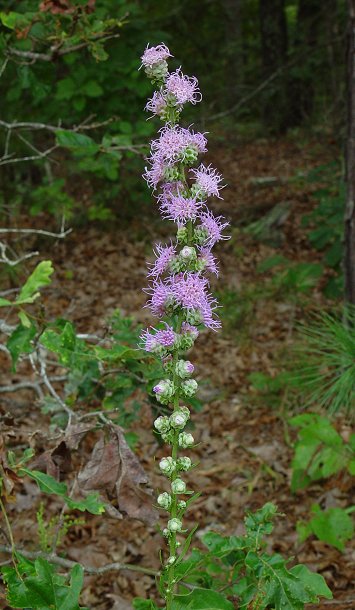Liatris aspera Michx.
Rough Gayfeather

Native
CC = 6
CW = 5
MOC = 75
© DETenaglia
Liatris aspera Michx.Rough Gayfeather | |
 |
Native CC = 6 CW = 5 MOC = 75 |
© DETenaglia |
|
Family - Asteraceae/Eupatorieae Habit - Perennial forb with a globose to ovoid corm, this sometimes appearing somewhat erect and angular or irregular. Stems - Ascending to erect, to 1.8 m, ribbed, moderately to densely pubescent with short, curled hairs, sometimes nearly glabrous toward the base.
Leaves - Alternate, petiolate below, sessile above. Basal and adjacent lower stem leaves short-to long-petiolate, the blades 6-25 cm long, 4-25 mm wide, oblanceolate to narrowly elliptic (rarely broader), the surfaces glabrous to densely short-hairy and gland-dotted, green, with 1 main vein, grading abruptly to the shorter stem leaves, these mostly sessile, 2-10 cm long, narrowly oblanceolate to more commonly linear.
Inflorescence - Elongate spicate racemes, the heads mostly relatively loosely to more densely spaced, the axis usually visible between heads, sessile or with stalks to 8 mm long, these usually with only 1 basal bract.
Heads - Heads with 14-30 disc florets, the terminal head not noticeably larger than the others. Involucre 9-16 mm long, broadly cup-shaped to broadly bell-shaped, with 4 or 5 unequal, overlapping series of bracts, the outer series appearing progressively shorter. Involucral bracts broadly obovate to oblong-spatulate, all but the innermost series spreading or recurved at the tip, mostly with broad, thin, pale to transparent margins, the margins or entire bracts sometimes strongly purplish-tinged, appearing irregularly torn or strongly uneven, the main body appearing swollen or pouched toward the tip.
Flowers - Ray florets absent. Disk florets to 30 per head. Corollas 8-11 mm long, 5-lobed, the tube hairy on the inner surface, glabrous externally. Pappus bristles barbed. Stamens 5, adnate near the basal 1/3 of the corolla tube. Filaments white, pubescent. Anthers brownish, connate around the style, 3-4 mm long, partially exserted. Style white in lower 1/3, purple in apical 2/3, glabrous, divided for the apical 2/3, to 1.3 cm long. Stigmas spreading. Achenes white in flower, 3mm long. Pappus of many capillary bristles. Bristles barbellate, 6-8mm long, white with purple apices.
Fruits - Achenes 4-6 mm long, densely antrorse pubescent.
Flowering - August to November. Habitat - Upland prairies, loess hill prairies, glades, ledges and tops of bluffs, savannas, forest openings, pastures, railroads, roadsides. Also cultivated. Origin - Native to the U.S. Other info. - This species of Liatris is fairly common across Missouri. Its wider range is largely defined by a wedge-shaped band extending from southern Texas and Louisiana northward through Minnesota and into Canada. It is also popular in cultivation. This is also an easy species to identify in the field from its distinct phyllaries. These have a distinct pouched appearance with ragged-looking margins. Photographs taken off Hwy 60 and off Hwy C, Carter County, MO., 8-28-03 (DETenaglia); also at McGee Creek State Park, Atoka County, OK, 7-26-2016, and Little Lost Creek Conservation Area, Warren County, MO, 9-6-2016 (SRTurner). |